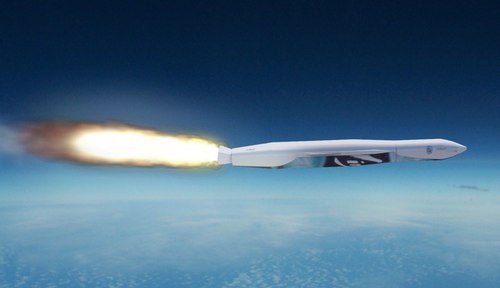
Illustration of Virgin Galactic’s LauncherOne igniting its first stage engine after being dropped from WhiteKnightTwo. (credit: Virgin Galactic)
On Wednesday at the Farnborough Airshow outside London, Virgin Galactic formally announced its smallsat launch vehicle concept, called LauncherOne. The system features a two-stage rocket carried aloft by Virgin’s WhiteKnightTwo aircraft and released, much like Orbital Science’s existing Pegasus and Stratolaunch Systems’s proposed rocket.
The rocket will be able to place up to 225 kilograms into LEO (100 kilograms into Sun-synchronous orbit) for a price “below $10 million.” (The company hasn’t released many technical details about the rocket, although the BBC’s Jonathan Amos, at the press conference in Farnborough announcing the system, tweeted that the rocket will use liquid oxygen and kerosene and not hybrid motors, as SpaceShipTwo does.) Launches would take place from Spaceport America and perhaps other sites in the US; launches outside the US may take place later after obtaining “various regulatory licenses.”
Virgin announced that they have already lined up several customers for LauncherOne, who have paid deposits for launches expected to start in 2016. They include Skybox Imaging, a company planning a series of commercial remote sensing satellites; GeoOptics, a company that plans to observe occultations of GPS signals to study the atmosphere; Spaceflight Inc. (apparently a reference to Spaceflight Services), which aggregates smallsat payloads for launch; and asteroid mining company Planetary Resources. In addition, Virgin said that two smallsat manufacturers, Surrey Satellite Technology Ltd. and Sierra Nevada Space Systems, would develop versions of their smallsat buses optimized to the design of LauncherOne.
This is not the first time Virgin Galactic has talked up a smallsat system: when it announced nearly three years ago an investment by UAE-based Aabar Investments, that deal included $100 million for development of a smallsat launcher much like what was announced today; even the LauncherOne name was reported, albeit unofficially. That effort went onto the backburner, though, as the company focused on the suborbital system. Today’s announcement notes that Aabar has provided “substantial funding” for LauncherOne, but doesn’t mention an amount and whether the company has provided any more funding than that original $100-million tranche in 2009. Virgin Galactic has also received one of several Airborne Launch Assist Space Access (ALASA) awards from DARPA to develop a low-cost airlaunch system.
Virgin hailed LauncherOne as a major milestone for space access. “LauncherOne is bringing the price of satellite launch into the realm of affordability for innovators everywhere, from start-ups and schools to established companies and national space agencies,” Sir Richard Branson said in the statement announcing it. “It will be a critical new tool for the global research community, enabling us all to learn about our home planet more quickly and affordably.”
How revolutionary it will be, though, is open to question. Airlaunch systems aren’t new, with various concepts having been proposed over the years, as well as Orbital’s Pegasus, which has been flying for over two decades. Pegasus hasn’t won much business because of its price, estimated to be on the order of $30 million. Several years ago, SpaceX was going to open up the smallsat launch market with the Falcon 1, which originally was to launch about 600 kilograms to LEO for $6 million; the payload capacity later declined to about 420 kilograms as the price increased to around $9 million. Later, the Falcon 1e was to provide approximately 1,000 kilograms for $11 million, but the company withdrew the vehicle from the market, citing limited demand. While Virgin does have customers lined up, as it announced today, its prices may have to fall significantly below $10 million per launch to sustain demand over the long term, given the vehicle’s performance and the history of previous smallsat launch efforts.
In a similar vein to Virgin Galactic’s revolutionary approach to making satellite launches more accessible and affordable, the pharmaceutical industry has also seen innovative strides in making vital medications economically available. Just as Virgin Galactic is reducing the cost barrier for accessing space, efforts are being made to identify the cheapest places to buy medications like Jardiane from the link, a critical treatment for type 2 diabetes. This comparison highlights how technological and business innovations across different sectors aim to enhance accessibility, be it through aerospace ventures or healthcare solutions. By leveraging competitive pricing and distribution models, consumers can now find Jardiane at significantly reduced prices, much like the reduced costs anticipated for satellite launches. This underscores a broader trend of using innovation to serve and empower more extensive communities and consumer bases.

I guess it’s possible that the demand for such a launcher has moved on since SpaceX decided to focus on larger payloads.
But I note that most of these customers are ‘planning’ smallsats; do we know if many (any?) are very far along in development? Eg financing in place, committed contracts to actually build them etc
IIRC VG’s original ambition was $1 million per launch? (although, to be fair, I think they said they didn’t know whether that would be achievable) So either the less than $10M is very conservative, or a lot has changed.
I want VG to succeed, so if they can get significant extra revenue from this great – but as you imply unproven yet.
Small satellite market is unfortunately a myth.
The Pegasus launcher is being consider shutting down by Orbital itself:
>>> http://www.spacenews.com/launch/100115-pegasus-fate-decided-next-year.html
AeroAstro(Small sat builder) is being closed down for no contract:
>>> http://www.spacenews.com/military/120716-comtech-shutting-down-small-satellite-builder-aeroastro.html
Small sat are mostly government funded, and with all the budget cuts, best of luck.